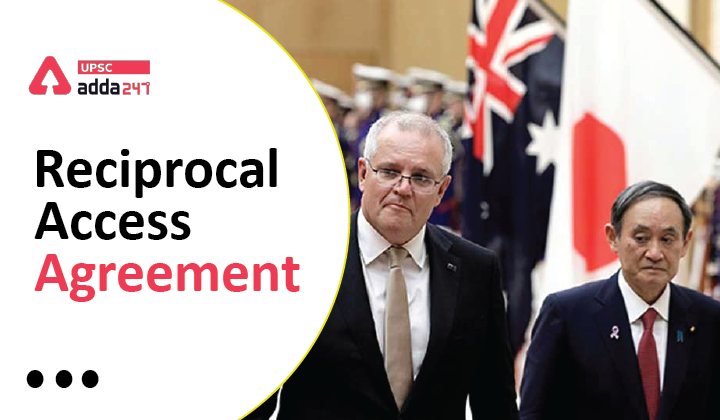Table of Contents
Reciprocal Access Agreement: Relevance
- GS 2: Bilateral, regional and global groupings and agreements involving India and/or affecting India’s interests.
Reciprocal Access Agreement: Context
- Recently, Reciprocal Access Agreement (RAA) was signed between Australia and Japan to bolster security ties against the backdrop of rising Chinese military and economic might.
Reciprocal Access Agreement: Key points
- The Reciprocal Access Agreement (RAA), Japan’s first with any country, will allow the Australian and Japanese militaries to work seamlessly with each other on defence and humanitarian operations.
- Japan is Australia’s closest partner in Asia as demonstrated by the special strategic partnership, Australia’s only such partnership.
- The agreement comes in response to tension over Chinese-claim over Taiwan, which has been rising as President Xi Jinping seeks to assert China’s sovereignty claims over the democratically ruled island.
- With its entry into force, the Japan-Australia RAA will facilitate implementation of cooperative activities between the defence forces of the two countries and further promote bilateral security and defence cooperation.
- The agreement will also pave the way for an enhanced contribution by Japan and Australia to the peace and stability of the Indo-Pacific region.
Reciprocal Access Agreement: Why significant?
- Apart from being of strategic significance for Asia and the Indo-Pacific, the agreement fortifies trends that are part of the changing security architecture in the region.
- It marks the move away from a US-centric polices towards a greater focus on bilateral ties and regional groupings.
- After the Second World War, the security order in Asia and the Indo-Pacific was marked by the US’s bilateral ties with various players, which was in contrast to American strategy in Europe, where NATO played a key role.
- The Quadrilateral Security Dialogue (or the Quad), with India, Japan, Australia and the US, the AUKUS, and now the RAA between Japan and Australia all point towards a more empowered and committed regional strategic network.
- Both Australia and Japan are continuously standing up to China on the question of a free and open Indo-Pacific and rules-based global order
- It is also a sign that Japan is willing to play a more proactive role in the region.
India’s engagements
- India has also focussed upon expanding bilateral, trilateral and regional cooperation in the security domain.
- India has “2+2” ministerial dialogues with both Tokyo and Canberra.
- Nevertheless, it must step up this engagement, as well as reach out to other players in the region.
Also Read:





 TSPSC Group 1 Question Paper 2024, Downl...
TSPSC Group 1 Question Paper 2024, Downl...
 TSPSC Group 1 Answer key 2024 Out, Downl...
TSPSC Group 1 Answer key 2024 Out, Downl...
 UPSC Prelims 2024 Question Paper, Downlo...
UPSC Prelims 2024 Question Paper, Downlo...
